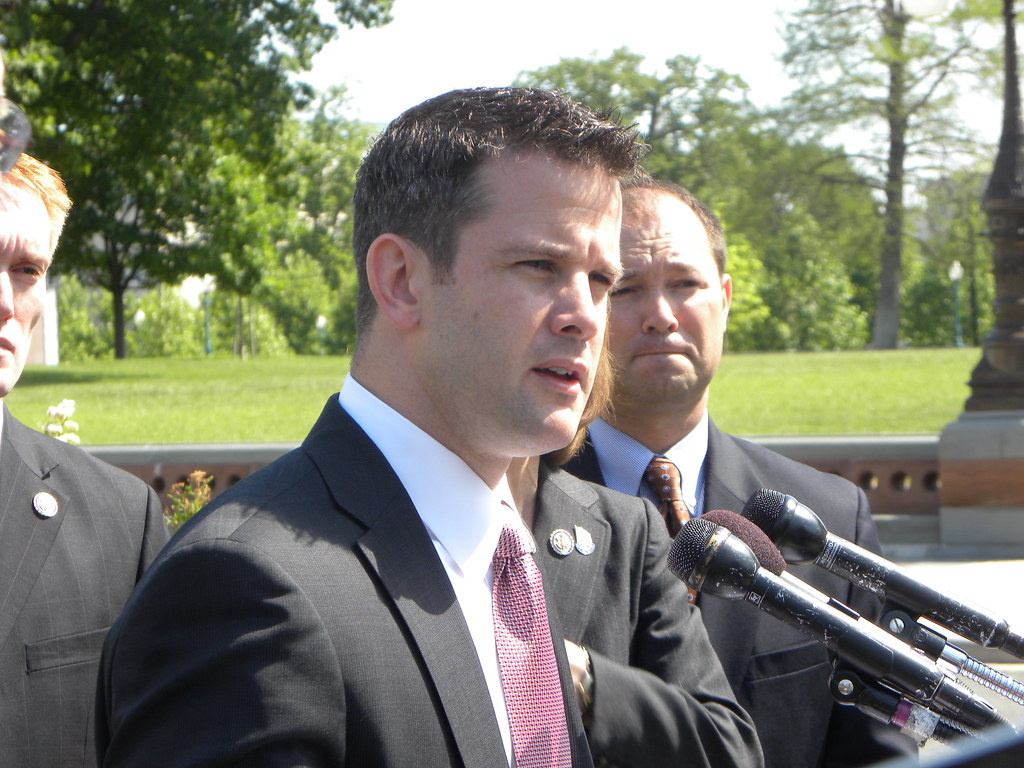Key Takeaways
- Former Rep. Adam Kinzinger sharply criticized the Heritage Foundation president for refusing to condemn a white nationalist.
- Kevin Roberts hesitated to denounce Nick Fuentes after his interview with Tucker Carlson.
- The controversy has split staffers at the Heritage Foundation.
- Kinzinger warned that the GOP’s moral “firewall” against extremists is crumbling.
- Debate raises questions about unity and values within the Republican Party.
Adam Kinzinger took the spotlight on CNN to call out Kevin Roberts, head of the Heritage Foundation, for not condemning white nationalist Nick Fuentes. Suddenly, the watchdog group known for shaping Project 2025 faces internal chaos. This clash shows deep rifts in today’s Republican ranks.
Kinzinger Confronts Roberts on Live TV
On Thursday evening, CNN anchor Anderson Cooper pressed Roberts to condemn hateful remarks. Yet Roberts refused. He even claimed Fuentes and host Tucker Carlson should not be deplatformed. In response, former Rep. Adam Kinzinger expressed disbelief. “It’s crazy,” he said. Kinzinger pointed out that Donald Trump once invited Fuentes and Kanye West to Mar-a-Lago for lunch.
Unexpectedly, Roberts backtracked only after days of outrage. Meanwhile, staffers at the Heritage Foundation grew angry and worried. They felt the organization’s reputation was at stake.
Why the Heritage Foundation Split Over Fuentes
The Heritage Foundation has long been a powerful think tank in conservative politics. In fact, it helped craft policy plans for past GOP leaders. However, Roberts’ stance on deplatforming Fuentes exposed a fracture.
First, some employees demanded a clear rejection of white nationalism. They argued that refusing to condemn a known Holocaust denier went against core values. Others worried about rocking the boat. They feared alienating far-right supporters who admire Fuentes.
Consequently, this tension spread through hallways and email chains. Some senior staff even threatened to resign. Ultimately, the Heritage Foundation president issued a delayed apology. Yet the damage lingered as trust eroded.
What It Means for the GOP
This clash signals deeper trouble for the Republican Party. Traditionally, a moral “firewall” kept extremist voices at arm’s length. Kinzinger warned that this barrier is crumbling. He said some top figures now view any right-wing figure as an ally, no matter how extreme.
Furthermore, public approval of the party may suffer. Polls show many voters expect clear lines against hatred. When leaders hesitate, they risk losing support. In fact, a few GOP senators, including Ted Cruz, swiftly denounced Fuentes. Their prompt response earned Kinzinger’s praise. Yet more voices are needed.
Moreover, this issue spills into election strategy. For example, some local campaigns face pressure to disavow extremist ties. Voters ask tough questions at town halls. They want assurance that candidates reject hate.
Next Steps and Reactions
After intense backlash, the Heritage Foundation president released a statement condemning Fuentes’ views. However, critics say the apology came too late. They want a firm policy banning any extremist from official events or interviews.
Adam Kinzinger, now a CNN commentator, urged the GOP to act swiftly. He called on party leaders to expel extremist voices. He stressed that inaction only grows the threat.
Meanwhile, other think tanks and advocacy groups watched closely. Many fear the split at the Heritage Foundation could inspire similar fights elsewhere. They warn that failure to address hate speech can harm democracy itself.
In addition, grassroots activists plan protests outside major GOP gatherings. They demand clear, written pledges to exclude extremist speakers. Only time will tell if the party heeds their call.
Heritage Foundation’s Future in Question
In the wake of controversy, the Heritage Foundation faces an identity crisis. Staff morale is low. Donors question whether the organization can remain a reliable policy leader. If more defections occur, its influence in Washington may shrink.
Nevertheless, some insiders believe a strong leader could restore unity. They propose new guidelines for speakers and partners. This would include mandatory background checks on invited guests.
However, implementing such rules will test the Heritage Foundation’s commitment to its founding mission. Can it balance open debate with ethical boundaries? The coming months will reveal whether it can regain stability.
Why This Matters to You
Whether you follow politics or not, this debate touches on core values. It highlights how organizations handle hate speech and extremist ties. As citizens, we rely on think tanks to propose fair, research-based policies. When those groups falter, policy making can suffer.
Additionally, this story shows the power of media pressure. Without strong questioning by anchors like Anderson Cooper, the issue might have stayed hidden. This underscores the role of a free press in holding leaders accountable.
In conclusion, the clash between Adam Kinzinger and the Heritage Foundation president over Nick Fuentes reveals deep divisions within the GOP. It raises urgent questions about the party’s moral direction. Moving forward, leadership decisions will shape not only elections, but also the nation’s wider fight against extremist ideologies.
Frequently Asked Questions
What triggered the dispute at the Heritage Foundation?
The fight began when the organization’s president refused to condemn white nationalist Nick Fuentes after his interview with Tucker Carlson. Staffers and politicians found this stance unacceptable.
How did Adam Kinzinger respond?
On CNN, Kinzinger harshly criticized the Heritage Foundation president for delaying a clear rejection of Fuentes’ hateful views. He warned that the GOP’s moral firewall is crumbling.
Has the Heritage Foundation changed its policy since the backlash?
The president issued a delayed apology and condemned Fuentes’ views. Some insiders now call for stricter speaker guidelines to avoid future controversies.
Why is this controversy important for voters?
It shows how political groups handle extremist ties. Voters seeking clear ethical standards want assurance that hate speech will not be tolerated in mainstream politics.
